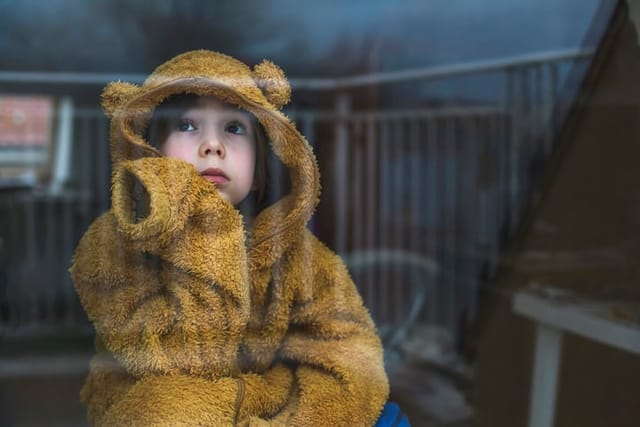Growing up without money didn’t make you stronger, it just made you resourceful. And yeah, some of those lessons stick with you long past escaping the struggle. If you were poor throughout childhood and even into young adulthood, here are some things you’ll understand all too well.
1. “Free” wasn’t actually free.

Giveaways, samples, sign-up bonuses… they come with suspicion. That’s because nothing was ever actually free – there was always a hidden cost, whether that was strings attached, future commitment, or embarrassment at being judged for seeking help. You’re suspicious of any offer that seems a bit too generous because you know it’s likely not what it seems.
Don’t miss out – follow Bolde for exclusive content daily
2. Having second-hand stuff came with a stigma.

Hand-me-downs weren’t just clothes, they were a way of life. You understood the stigma attached to wearing second-hand clothes and shoes or even playing with second-hand toys, but you also knew the practicality and resourcefulness they represented. Over time, you came to appreciate the value of thriftiness and sustainability and you found beauty in repurposing and reusing items.
You may also like: 20 Ways A Narcissist Acts When They Can’t Control You
3. You often got left out when you didn’t have the cash to take part.

Birthday parties, school trips, or even simple outings with friends sometimes felt out of reach. It wasn’t because you weren’t invited; it was because you couldn’t afford to participate, leaving you feeling left out and different from other kids your age. Despite the moments of isolation, these experiences gave you a deep sense of empathy and resilience, shaping your understanding of inclusion and exclusion.
Don’t miss out – follow Bolde for exclusive content daily
4. Taking advantage of sales wasn’t just smart, it was a survival tactic.

Seeing something discounted wasn’t about getting a deal, it was about finally affording the thing you desperately needed. That clearance rack might as well be the holy grail when paying full price is never an option. You got your school clothes, your dinner, and even your Christmas presents on sale — it was the only way your parents could afford it.
5. Financial stress was too real.

From a young age, you understood the weight of financial stress. It was the constant worry about bills, eviction notices, or where the next meal would come from that shaped your perspective on money and security. Despite the challenges, these experiences cultivated resilience and resourcefulness, equipping you with the skills to navigate adversity and uncertainty.
Don’t miss out – follow Bolde for exclusive content daily
6. “What do you want for…” was code for dread.

Birthdays, holidays, any gift-giving occasion triggered a mix of excitement and anxiety. Wanting cool stuff is normal, but knowing your parents would stress over cost created guilt you couldn’t understand as a kid. You had a wishlist as long as your arm, but you wouldn’t dare ask for it in case our parents felt pressured to somehow find a way to get it for you.
7. You had to work to hide how broke you were.
You learned to hide your family’s financial struggles from other people, putting on a facade to avoid judgment or pity. It was about maintaining a sense of pride and dignity in the face of adversity. However, this burden of secrecy also weighed heavily on you, creating a sense of isolation and shame that lingered long after you left behind your childhood circumstances.
Don’t miss out – follow Bolde for exclusive content daily
8. You were always dreaming of a better future.

Despite the challenges, growing up poor instilled in you a sense of resilience and determination. It was about dreaming of a better future and working hard to break the cycle of poverty for yourself and future generations. These dreams fueled your ambition and drive, propelling you forward even in the face of seemingly insurmountable obstacles.
You may also like: 30 Things Men Do When They’re Having A Midlife Crisis
9. Nothing was ever actually broken, it was “vintage.”

When every item you own is well past its prime, you master creative workarounds. Repairing and repurposing wasn’t a cute DIY thing when you were growing up — it was the only way you survived with hand-me-downs and worn-out belongings. Buying new just wasn’t an option most of the time, so you had to get creative. On the plus side, you’re much more resilient these days as a result.
Don’t miss out – follow Bolde for exclusive content daily
10. Hunger was about more than just an empty stomach.

It was worrying the stuff in your kitchen cabinets wouldn’t last till payday, stretching meals far beyond serving size, and the quiet shame of being jealous of other kids’ packed lunches or the fact that they had pocket money to get snacks on the walk home from school. The weight of food insecurity goes deeper than appetite, and you experienced it first-hand on many occasions.
You may also like: 15 Adult Traits of People Who Were Bullied As Kids
11. Talent went nowhere without opportunity.

Watching potential go untapped fuels a deep frustration. Being good at something meant nothing if paying for lessons, supplies, or even the gas to attend auditions or tournaments was impossible. You might have wanted to learn to play an instrument but couldn’t afford to rent it. Or, maybe you wanted to join gymnastics or football with your friends but your parents couldn’t pony up for the lessons or uniform costs.
Don’t miss out – follow Bolde for exclusive content daily
12. You never knew the meaning of “treat yourself.”

Budgeting definitely didn’t leave room for luxury when you were growing up poor. Every expense was scrutinized out of necessity. Even when you finally break out of the paycheck-to-paycheck life, splurging can induce panic instead of joy. You’re just not used to being able to buy yourself something that wasn’t 100% necessary, especially since many times growing up, you couldn’t even do that!
You may also like: People Who Lack Self-Awareness Frequently Say These 14 Things
13. You truly understood the value of hard work.

Growing up with financial struggles instilled in you a strong work ethic from a young age. Whether it was watching your parents work multiple jobs to make ends meet or taking on part-time jobs yourself to contribute to the family income, you learned the value of hard work and perseverance.
Don’t miss out – follow Bolde for exclusive content daily
14. Class differences became glaringly obvious.

You spotted it in subtle ways most people miss – worn-out shoes, vocabulary usage, how they pack a lunch. You don’t look down on these people, but you recognize those silent status marks and where you fall. You remember what it was like to be at the bottom of the chain, and maybe you’re still there. It’s amazing how having money allows you much more ignorance.
You may also like: People Who Rarely Exhibit Empathy Usually Have These 16 Traits
15. Gratitude and resentment coexisted in your life.

You’re thankful for resilience… sometimes. But it’s hard not to imagine alternative timelines where a lack of money didn’t dictate so many choices and missed opportunities. It’s hard to move past it even if your situation in life is completely different these days.
Enjoy this piece? Give it a like and follow Bolde on MSN for more!




